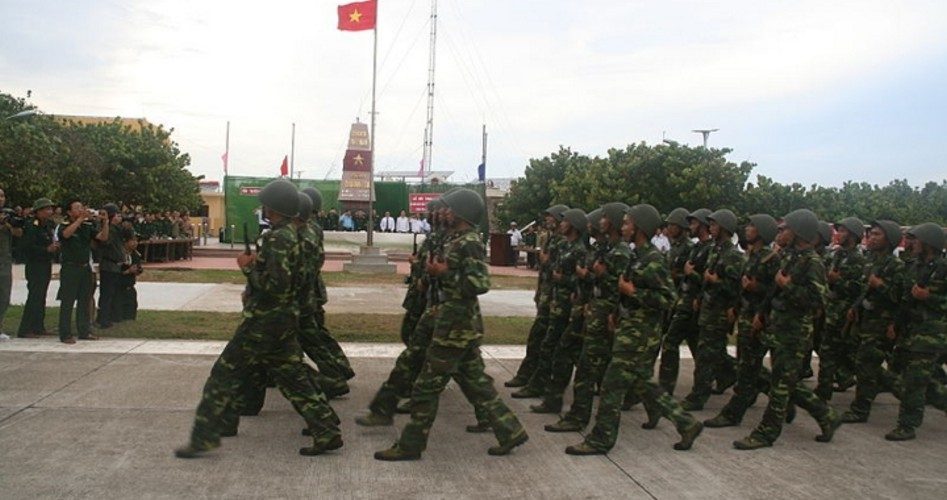
On Monday, President Obama announced that the United States will be lifting its decades-long ban on sales of military equipment to Vietnam, provoking criticisms that the president lost the necessary leverage to compel Vietnam to improve its human rights record. And while some experts contend that the lift is part of an effort to counter China’s growing strength in the region, President Obama claims it is simply intended to standardize relations between the United States and Vietnam.
“The decision to lift the ban was not based on China or any other considerations,” Obama claimed during a joint press conference with the Vietnamese president, Tran Dai Quang. “It was based on our desire to complete what has been a lengthy process of moving toward normalization with Vietnam.”
Quang said essentially the same thing: “Vietnam very much appreciates the U.S. decision to completely lift the ban on lethal weapon sales to Vietnam, which is the clear proof that both countries have completely normalized relation.”
But despite these claims, recent events seem to indicate that it is more complicated than that. CNN reports, “While Vietnam and China are neighbors that share a communist ideology, China has aggressively claimed territory in the South China Sea, irking Vietnam and other Southeast Asian neighbors and also raising concerns internationally.”
The ban against the sale of military weapons to Vietnam had been imposed in 1984 but was relaxed in 2014 after Hanoi asked to purchase American lethal weapons in response to China placing an oil rig in waters near the Paracel Islands. The United States granted the purchase of nonlethal equipment at the time.
According to CNN, China recently engaged in a “provocative show of force” when it flew two jets within close proximity of a U.S. aircraft stationed in the disputed region.
Until recently, lifting the embargo was to be contingent upon Vietnam improving its human rights record, but the New York Times reports that the turnaround appears to have been provoked by “China’s buildup in the South China Sea.”
But China is doing its best to appear unmoved by the president’s announcement, alleging to welcome the ban’s lifting. China’s Ministry of Foreign Affairs Hua Chunying issued a statement on Monday claiming the lift was overdue.
“(The) arms sales ban was a product of the Cold War and should no longer exist,” she told reporters. “We hope the lifting of all such bans will benefit regional peace and development. And we are happy to see the United States and Vietnam develop normal cooperative relations.”
Though no such announcement has been made, the New York Times writes that analysts have speculated that in return for lifting the embargo, Vietnam may grant the United States access to the deepwater port at Cam Rahn Bay.
But while there is no evidence that such a deal has been struck, the president did announce commercial deals involving Boeing and Pratt & Whitney that are worth over $16 billion.
The president’s decision to lift the ban has provoked criticisms from organizations that claim Vietnam’s poor record on human rights has not warranted this show of support from the United States. Human Rights Watch Executive Director Kenneth Roth has accused the president of choosing to “arm Vietnam as an anti-China ally rather than care about its ongoing repression.”
Phil Robertson, deputy director of Human Rights Watch’s Asia division, said that Obama has virtually lost the necessary leverage to force Vietnam to improve its human rights record. “In one fell swoop, President Obama has jettisoned what remained of U.S. leverage to improve human rights in Vietnam — and basically gotten nothing for it,” he said. “President Obama just gave Vietnam a reward that they don’t deserve.”
The president has defended his decision by indicating that future arms sales will still be evaluated to determine “what’s appropriate and what’s not.”
“We’re going to continue to engage in the case-by-case evaluation of these sales,” Obama said. “But what we do not have is a ban that is based on an ideological division between our two sides.”
Addressing the human rights criticisms, Obama relegated Vietnam’s human rights record as “an area where we still have differences.”
Obama and Quang made a symbolic show of diplomacy by shaking hands in front of a large bronze bust of Vietnamese communist revolutionary leader Ho Chi Minh inside the Presidential Palace. “We’ve come here as a symbol of the renewed ties we have made over the last several decades and the comprehensive partnership we have created over the course of my presidency,” Obama said.




